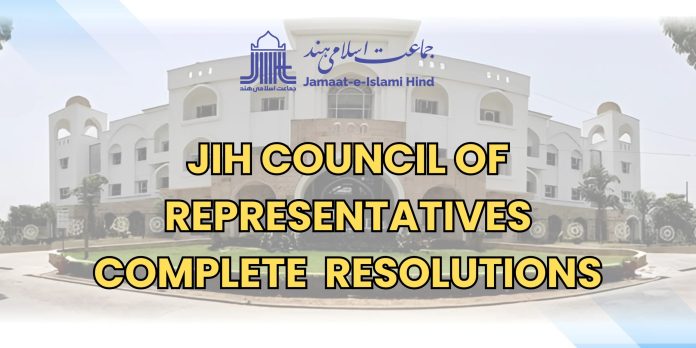New Delhi: In a significant four-day session from April 12 to 15, 2025, the Council of Representatives of Jamaat-e-Islami Hind (JIH), held at its headquarters in New Delhi under the leadership of President Syed Sadatullah Hussaini, passed a series of key resolutions addressing national and international crises. The Council expressed deep concern over recent legislative actions, communal polarization, economic disparity, and global human rights violations, especially in Palestine.
Repeal of the Waqf Amendment Act, 2025
The JIH Council strongly condemned the newly enacted Waqf Amendment Act, 2025, labeling it as unconstitutional, unjust, and discriminatory. The Act, the Council observed, allows government officials to adjudicate waqf disputes—effectively permitting the state to be both a party and a judge. This opens the door to illegal encroachments and the potential seizure of long-standing religious properties, particularly those historically utilized by the Muslim community but lacking documentation.
The Council emphasized that the law undermines Article 26 of the Indian Constitution and disregards the voices of stakeholders. It called for the immediate repeal of the Act, urging public support for the All India Muslim Personal Law Board’s campaign. JIH appreciated the stance taken by several MPs and organizations, encouraging sustained resistance until justice prevails.
Condemnation of Israeli Brutality in Gaza
JIH unequivocally condemned Israel’s relentless military assault on Gaza, describing it as one of the gravest humanitarian crises in contemporary history. With over 60,000 civilians reportedly killed, and vital infrastructure—hospitals, schools, and shelters—obliterated, the Council condemned the killing of aid workers and journalists, and Israel’s blatant violations of international law.
The Council demanded an immediate ceasefire, opening of humanitarian corridors, and recognition of Palestinian sovereignty. JIH urged India to return to its traditional pro-Palestine stance, sever all support to Israel, and back global calls for justice, including sanctions and boycotts. It lauded the courageous student-led protests worldwide and reiterated that the oppressors will eventually be held accountable.
Call for a Just and Ethical Global Economic System
Expressing concern over the deteriorating global trade environment—particularly due to protectionist measures by the United States—JIH criticized the growing inequality fostered by unchecked capitalism, greed, and nationalism. The Council noted that such policies disproportionately affect poor and developing nations.
JIH called on India to adopt diversified trade strategies, reduce reliance on Western economies, and prioritize small businesses and marginalized communities. The Council also promoted interest-free and ethical financial alternatives as means to achieve justice-oriented economic reform.
Defense of Constitutional and Ethical Norms
The Council condemned the rising tide of communal violence, state-led demolitions of Muslim-owned properties, disruptions at religious sites, and increasing attacks on Islamic institutions. It also criticized selective law enforcement and political protectionism that encourage hate and erode national unity.
JIH reminded the government of its constitutional responsibility to ensure equal treatment for all citizens and called on extremist groups to abandon divisive tactics. Muslims were urged to uphold moral leadership by promoting peace and justice within society.
Addressing Domestic Economic Inequality and Exploitation
Highlighting the disparity between booming economic sectors and widespread poverty, JIH criticized policies that have neglected rural India, MSMEs, and the informal workforce. The Council pointed out the regressive nature of rising indirect taxes and declining subsidies, alongside excessive corporate favoritism.
JIH called for a people-centric economic model, advocating for stronger public health and education infrastructure, welfare for farmers and workers, and interest-free financial support systems to encourage inclusive and equitable growth.
Rejection of Uniform Civil Code (UCC)
The Council firmly rejected the imposition of a Uniform Civil Code, terming it an attack on India’s legal diversity and religious freedom. JIH particularly opposed the UCC law in Uttarakhand and condemned similar legislative attempts in other states like Gujarat.
According to the Council, such laws disproportionately target Muslims and threaten the social fabric by undermining personal laws that are essential to India’s pluralistic democracy. JIH resolved to resist any such unilateral legislation.




